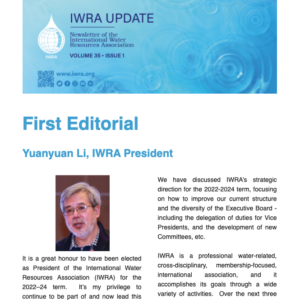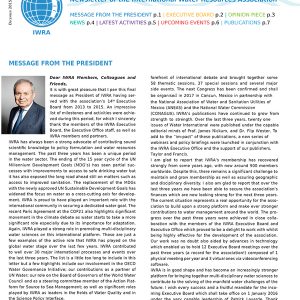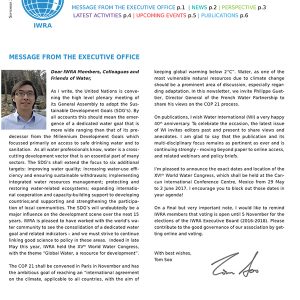
Callum Clench, IWRA Executive Director
As we approach the end of 2019, as ever at this time of the year, it is a good occasion to reflect on what has happened over the past 12 months, and to also look forward to the exciting things that await us next year. 2019 was important for raising general awareness about many water related issues, not least climate change and plastic pollution in our water ways and the oceans. Younger people have especially taken up the mantel with climate strikes and resonating voices such as Greta Thunberg capturing the world’s attention. We have seen more drought related disaster, including the current long-running bush fires in Australia with record breaking temperatures; and the new evolving seasonal cycles of freezing rains in places that usually expect snow.
While COP25 has just taken place in Madrid, we still struggle to get the water message into the climate change discussions. In a bid to change this, the UN-Water World Water Day theme for 2020 will be “Water and Climate Change”. We all know that adaptation to climate change is necessary and unavoidable. This means not just adaption to changing temperatures, but also to changing water cycles, water quality, and especially water quantity. Climate change has a direct impact on water security, so while everything possible must be done to mitigate greenhouse gas emissions, there also needs to be a clear acknowledgement that climate change adaptation is almost entirely about water.
Micro-plastic pollution in our waterways and seas has also really caught the public’s imagination over the past year. It is encouraging to see people taking this so seriously, and governments taking action, such as the EU banning plastic beads in toiletry products. Looking forward, the next water issue that is likely to grab the general public’s attention is pollutants of emerging concern, especially pharmaceuticals. We know that the majority of antibiotics, hormones and drugs designed to be easily absorbed into the body pass through our systems and end up in waterways. Once there, they mix in uncontrolled ways and no one is really sure what the impact of this will be. However, one fear is that there will be increasing amounts of antibiotic resistance in humans and livestock.
This is a much more complex issue than plastic, since a blanket ban on pharmaceuticals is not an option. Instead we need a cross-sectoral approach, to look at better ways of designing and using medication, and then how we treat the wastewater leaving our homes and farms. If not addressed, this too can reduce water security, especially in poorer communities as all societies become increasingly medicated.
Looking towards to 2020, the XVII World Water Congress from May 11-15 in Daegu, South Korea, will focus our collective minds as we address the theme “Foundations for Global Water Security and Resilience: Knowledge, Technology and Policy”. The IWRA World Water Congress is the world’s largest such event linking water researchers and policy practitioners. In 2020 we expect a large contingent of young professionals to be present, which is timely when we consider that issues such as those raised in this editorial will affect them more than most.
Remember that this is your Congress and we look forward to seeing you there. In the meantime, have a very Happy New Year!



